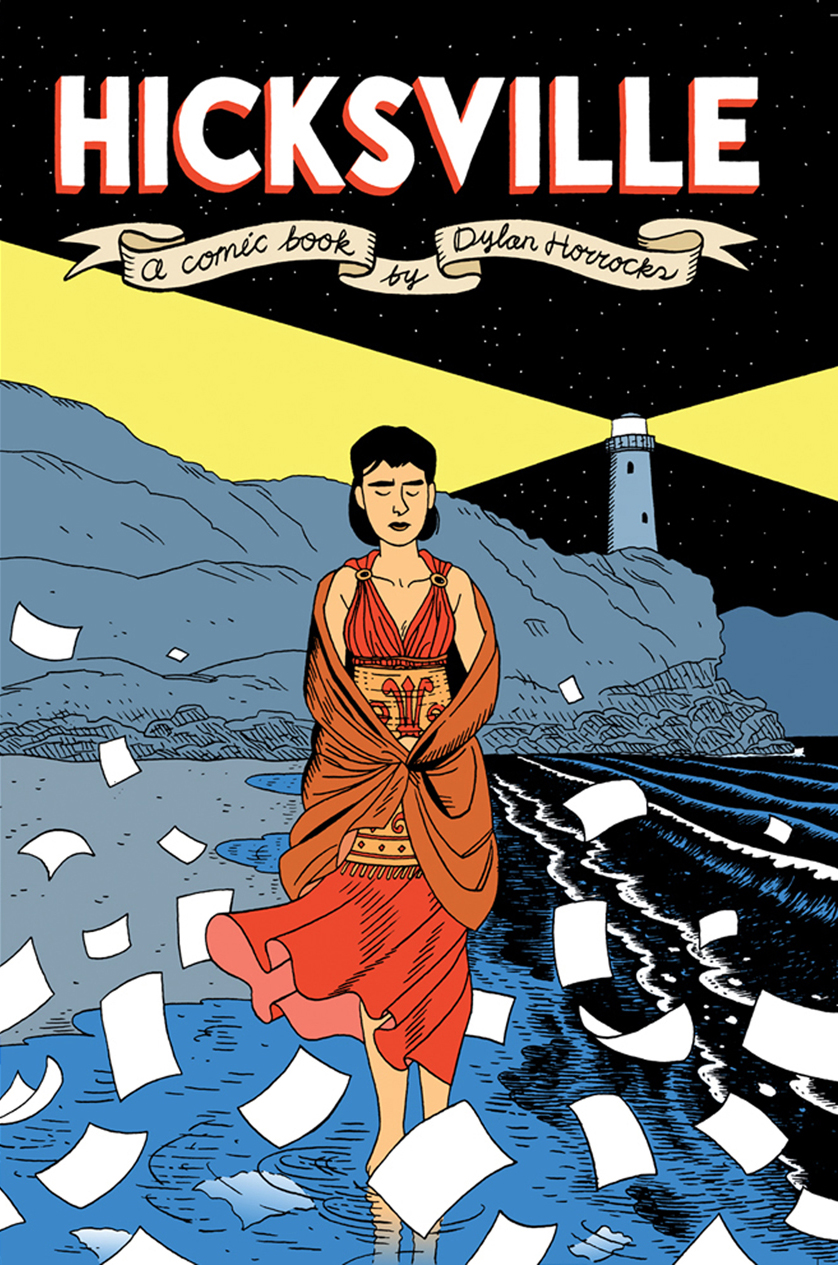Review: Hicksville
By Dylan Horrocks
Published by Drawn & Quarterly
$19.95
Review by Jason Azzopardi
Is it cliché, a decade and a half after its original publication, to say that Dylan Horrocks’ tender love letter to comics is one of the most important books in the medium, even after many, many people have already said it before? It might be. It doesn’t make that statement any less true. Amongst certain comics circles – the cords-cons-sweater-wearing types – Hicksville is the Rosetta Stone of sequential storytelling, and the inspiration for an entire generation of cartoonist.
There have been numerous articles written about the beauty of the book and its gentle affection for the past, and I’m not sure I can contribute much more to that. It is everything they say it is; a fable set in a secluded coastal village in New Zealand that seems to exist solely for the purpose of celebrating the comic book; a romance of lost souls trying to find love and contentment; a sly mystery that digs deep into the buried wrongs of an unrepentant medium. And while I have always loved the relationship bits, it’s that last one that mostly gets me now.
Re-reading Drawn & Quarterly’s beautiful new edition, I was particularly struck this time by Hicksville’s simmering fury. Perhaps it’s an age thing, but much of that missed me the first time around. I’m almost two decades older now, and have a much deeper understanding and appreciation for the history of comics.
Jack Kirby, Steve Ditko, Joe Simon, Jerry Siegel and Joe Shuster, Carl Barks, and in more modern terms, Alan Moore; one can’t help but be in awe at the pure craftsmanship and professionalism with which these creators fashioned the bedrock that most modern corporate comic empires are built upon. Their imagination wells ran deep, and publishers and their parent corporations have drawn water from them over and over and, just when you think the bucket might come up empty, over again, mostly without proper compensation or, in many cases, due credit. And yet, for some strange reason, these corrupt business practices are not only justified, but heralded by many comic fans, because morality and ethics does not seem to enter the picture for obsessive collectors or corporate lawyers. Only the letter of the law counts, not what is right. Work-for-hire is work-for-hire and, in their eyes, nobody forced these men to sign these contracts. It doesn’t matter that they essentially had to sign these “standard” agreements, exploitative even six decades ago, at a time when ownership of their own creations was unthinkable, and no one could have dreamed that other entertainment platforms and product licensing could crossover and desiccate their innovations until every last drop of blood has been squeezed out of them. They, like most unprotected workers at the time, just wanted to provide for their families and tell good stories through a medium they loved. Decades later, they live and die in poverty, without proper healthcare or life insurance, while their former employers reap billions off their creations.
I know it seems like I am veering off topic, but please let me stress that not only is this my topic, I believe it is Hicksville‘s as well. Dylan Horrocks is a gentle soul, and his comic is correspondingly gentle, but bubbling under its quiet utopic surface is a soft ferocity.
It has always been the nature of the mainstream comic book industry to eat its own tail. Every now and then, someone with true imagination comes along and changes the way in which stories are told. That, then, is exploited over and over and over again until all that remains are soulless regurgitations of “universe-changing” events and, sadly, yet another to-be-continued.
Personal stories are unwelcome.
Hicksville is a personal story – maybe one of the medium’s most personal – and I haven’t said too much about its plot or characters because to do so would be to spoil its many pleasures. But more than anything else, Hicksville is a ghost story about broken people reconciling their mistakes, and trying to heal just enough to forgive and be happy.
And in its quietly poetic way, Hicksville demands that the massive conglomerates currently running the industry as personal movie pitch farms acknowledge these mistakes and practice a more ethically sound means of excavation. The book doesn’t really believe that any of the creative or financial reparations owed to the original creators will be voluntarily paid out, but it believes with all its heart that they should. And “shoulds” make the world a better place. Shoulds ignore letter-of-the-law things like “bare minimum” and “not required”, and simply do what is decent.
Hicksville is a should.
Its pages exhale a sense of hope that every cords-cons-sweater-wearing fibre in my being savors. It is a very personal story about a very big mistake, and should be required reading for every superhero fan because it is one of the only comic books with a true conscience about where the medium came from and where it, unfortunately, is going.
Hicksville examines how we live and love and work, and most importantly, how to say sorry when we do those things poorly.

